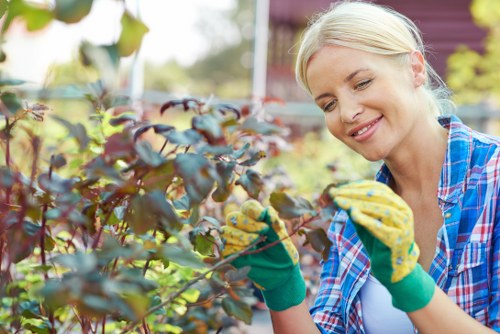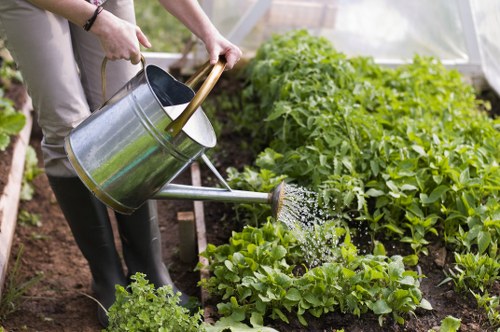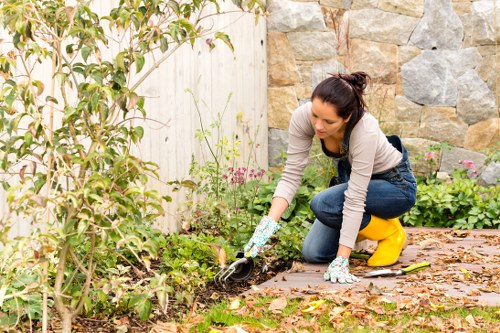Landscape Gardening in Barnet: Transforming Outdoor Spaces
Introduction to Landscape Gardening in Barnet

Landscape gardening in Barnet offers residents the opportunity to create beautiful and functional outdoor spaces tailored to their unique preferences and the local environment. Whether you have a sprawling garden or a modest backyard, professional landscape gardening can enhance the aesthetic appeal and value of your property.
Barnet's diverse climate and soil conditions provide both challenges and opportunities for gardeners. Understanding these factors is crucial in designing a landscape that thrives year-round. From selecting native plants to incorporating sustainable practices, landscape gardening in Barnet is about harmony with nature.
In this article, we will explore the key aspects of landscape gardening in Barnet, including design principles, plant selection, maintenance tips, and the benefits of professional landscaping services.
Design Principles for Barnet Gardens

Effective landscape gardening begins with thoughtful design. Consider the following principles to create a harmonious and visually appealing garden:
- Balance: Distribute elements evenly to create a sense of stability.
- Proportion: Ensure that the size of plants and structures complements the overall space.
- Harmony: Select materials and colors that work well together.
- Unity: Create a cohesive look by repeating certain elements throughout the garden.
- Focal Points: Incorporate features like water elements or sculptures to draw attention.
By applying these design principles, you can create a landscape that is not only beautiful but also functional and sustainable.
Plant Selection for Barnet's Climate

Choosing the right plants is essential for a thriving garden in Barnet. Consider the local climate, soil type, and sunlight when selecting plants. Native species are often the best choice as they are adapted to the local conditions and require less maintenance.
Some popular plants for Barnet gardens include:
- Lavender: Known for its fragrant flowers and drought resistance.
- Boxwood: Ideal for creating structured hedges and borders.
- Roses: A classic choice for adding color and fragrance.
- Hostas: Great for shaded areas with their lush foliage.
- Hydrangeas: Provide stunning blooms in various colors.
Incorporating a mix of perennials, shrubs, and trees can add texture and depth to your garden.
Hardscaping Elements in Landscape Gardening

Hardscaping refers to the non-living elements of your garden, such as paths, patios, walls, and water features. These elements add structure and functionality to your outdoor space.
Common hardscaping features include:
- Patios: Perfect for outdoor seating and entertaining.
- Paths: Guide visitors through the garden and connect different areas.
- Retaining Walls: Help manage slopes and prevent soil erosion.
- Water Features: Enhance the sensory experience with sounds of flowing water.
- Decks: Provide elevated platforms for enjoying the garden view.
Integrating hardscaping with softscaping creates a balanced and inviting landscape.
Maintenance Tips for a Lush Garden

Maintaining a beautiful garden requires regular care and attention. Here are some essential maintenance tips for landscape gardening in Barnet:
- Watering: Ensure plants receive adequate water, especially during dry periods.
- Weeding: Remove weeds regularly to prevent competition for nutrients.
- Pruning: Trim plants to promote healthy growth and maintain shape.
- Fertilizing: Provide essential nutrients to support plant health.
- Pest Control: Monitor for pests and take appropriate measures to protect your plants.
Implementing a consistent maintenance schedule will keep your garden vibrant and thriving throughout the year.
Benefits of Professional Landscape Gardening Services

While DIY gardening projects can be rewarding, professional landscape gardening services offer expertise and resources that can significantly enhance your outdoor space.
- Expertise: Professionals have the knowledge and experience to design and implement effective garden plans.
- Time-Saving: Hiring experts allows you to enjoy your garden without the time-consuming tasks of maintenance.
- Quality: Professional services ensure high-quality workmanship and lasting results.
- Customization: Services can tailor designs to your specific needs and preferences.
- Sustainability: Experts can incorporate eco-friendly practices to create a sustainable landscape.
Investing in professional landscape gardening can transform your garden into a stunning and functional oasis.
Choosing the Right Plants for Seasonal Beauty
To maintain year-round interest in your Barnet garden, select plants that offer seasonal beauty. Incorporate a variety of plants that bloom at different times and have diverse foliage.
Consider the following seasonal plants:
- Spring: Tulips, daffodils, and cherry blossoms add vibrant colors and fresh scents.
- Summer: Roses, lavender, and sunflowers provide long-lasting blooms and attract pollinators.
- Autumn: Chrysanthemums, ornamental grasses, and asters offer rich colors and textures.
- Winter: Holly, evergreens, and winterberries maintain structure and color during the colder months.
By planning for each season, you can ensure your garden remains attractive and lively throughout the year.
Sustainable Landscaping Practices
Sustainability is a key consideration in modern landscape gardening. Implementing eco-friendly practices benefits both your garden and the environment.
Effective sustainable practices include:
- Rainwater Harvesting: Collecting and using rainwater reduces dependency on municipal water supplies.
- Composting: Recycling garden waste into compost enriches the soil naturally.
- Native Planting: Native species require less water and are more resilient to local pests.
- Mulching: Applying mulch conserves moisture and suppresses weed growth.
- Solar Lighting: Using solar-powered lights minimizes energy consumption.
Adopting sustainable landscaping practices contributes to a healthier ecosystem and can reduce maintenance costs.
Integrating Technology in Landscape Gardening
Advancements in technology have revolutionized landscape gardening, making it easier to design, maintain, and enhance outdoor spaces.
Innovative technologies include:
- Smart Irrigation Systems: Automated watering systems optimize water usage based on weather conditions.
- Landscape Design Software: Digital tools allow for precise planning and visualization of garden layouts.
- LED Lighting: Energy-efficient lighting enhances the garden's ambiance during evenings.
- Drones: Used for surveying large gardens and monitoring plant health.
- Robotic Lawn Mowers: Automate grass cutting, saving time and effort.
Incorporating technology can improve the efficiency and effectiveness of your landscape gardening efforts.
Planning Your Barnet Garden
Effective landscape gardening starts with meticulous planning. Follow these steps to plan your Barnet garden:
- Assess Your Space: Measure your garden area and note existing features.
- Define Your Goals: Determine the purpose of your garden, such as relaxation, entertainment, or growing vegetables.
- Choose a Style: Select a garden style that reflects your personal taste, such as modern, cottage, or Japanese.
- Select Plants and Materials: Pick appropriate plants and hardscaping materials that suit your design.
- Create a Layout: Draw a floor plan to visualize the placement of different elements.
Thorough planning ensures that your garden meets your expectations and functions seamlessly.
Enhancing Privacy in Your Garden
Privacy is a common concern for many garden owners. Implementing strategies to create secluded spaces can enhance your outdoor experience.
- Hedges and Fences: Dense plantings or solid fences block unwanted views.
- Lattice Screens: Decorative screens provide partial privacy and add visual interest.
- Pergolas and Arbors: Structures covered with climbing plants create shaded and private areas.
- Tall Plants: Trees and tall shrubs act as natural barriers.
- Strategic Layout: Position seating areas away from neighbors and high-traffic zones.
By thoughtfully designing your garden layout, you can enjoy a private and tranquil outdoor space.
Creating Functional Outdoor Spaces
A well-designed garden not only looks good but also serves practical purposes. Consider the following functional elements:
- Outdoor Kitchens: Ideal for cooking and entertaining guests.
- Seating Areas: Comfortable spots for relaxation and socializing.
- Play Areas: Safe spaces for children to play and explore.
- Storage Solutions: Shelters or sheds to store garden tools and equipment.
- Lighting: Proper illumination ensures safety and extends the usability of your garden into the evening.
Integrating functional elements enhances the enjoyment and practicality of your outdoor space.
Seasonal Maintenance Tips
Maintaining your garden through the changing seasons requires specific care to ensure plants remain healthy and vibrant.
- Spring: Clean up winter debris, fertilize plants, and start planting new growth.
- Summer: Focus on watering, weeding, and providing shade to prevent heat stress.
- Autumn: Prune dead branches, prepare plants for winter, and add mulch to protect roots.
- Winter: Protect sensitive plants, plan for the next season, and perform necessary repairs to garden structures.
Adapting your maintenance routine to the seasons ensures the longevity and beauty of your garden.
Sustainable Water Management
Water management is a critical aspect of sustainable landscape gardening. Implementing efficient water use practices conserves resources and promotes plant health.
- Drip Irrigation: Delivers water directly to plant roots, reducing evaporation and waste.
- Rain Gardens: Capture and absorb rainwater, preventing runoff and replenishing groundwater.
- Permeable Paving: Allows water to infiltrate the soil, reducing surface runoff.
- Greywater Systems: Recycle household water for irrigation purposes.
- Native Planting: Native species typically require less supplemental watering.
Effective water management enhances the sustainability and resilience of your garden.
Incorporating Edible Plants
Adding edible plants to your landscape garden combines beauty with functionality. Growing your own fruits, vegetables, and herbs provides fresh produce and a sense of accomplishment.
- Vegetable Beds: Designate areas for growing a variety of vegetables.
- Fruit Trees: Plant trees like apples, pears, and cherries for seasonal harvests.
- Herb Gardens: Grow herbs such as basil, mint, and rosemary for culinary use.
- Berry Bushes: Include strawberries, raspberries, and blueberries for sweet treats.
- Vertical Gardens: Utilize vertical space for growing herbs and small vegetables.
Edible landscaping not only enhances your garden aesthetically but also provides practical benefits.
Lighting Solutions for Your Garden
Proper lighting enhances the beauty and safety of your landscape garden. It allows you to enjoy your outdoor space even after dark.
- Pathway Lights: Illuminate walkways and prevent tripping hazards.
- Accent Lighting: Highlight architectural features or focal points in your garden.
- Spotlights: Draw attention to specific plants or sculptures.
- Solar Lights: Energy-efficient options that reduce electricity usage.
- String Lights: Create a cozy and inviting atmosphere for gatherings.
Choosing the right lighting solutions can transform your garden into a magical evening retreat.
Seasonal Garden Decorations
Enhance your garden's charm with seasonal decorations that reflect the time of year and add character to your outdoor space.
- Spring: Fresh flowers, colorful pots, and garden statues.
- Summer: Outdoor furniture, umbrellas, and vibrant plantings.
- Autumn: Pumpkins, fall foliage displays, and harvest-themed decorations.
- Winter: Festive lights, evergreen arrangements, and decorative pathways.
- Year-Round: Water features, bird feeders, and wind chimes.
Incorporating seasonal decorations keeps your garden lively and engaging throughout the year.
Maximizing Small Garden Spaces
Even with limited space, you can create a stunning landscape garden in Barnet. Utilize space-saving techniques to make the most of your outdoor area.
- Vertical Gardening: Use trellises, shelves, and wall-mounted planters to grow plants upwards.
- Multifunctional Furniture: Choose pieces that offer storage or can be easily moved.
- Mirrors: Reflect light and create the illusion of a larger space.
- Compact Plant Varieties: Select dwarf or container-friendly plants.
- Strategic Layout: Plan pathways and seating areas to optimize flow and functionality.
With creativity and strategic planning, small gardens can be transformed into beautiful and functional outdoor havens.
Conclusion
Landscape gardening in Barnet offers endless possibilities for creating outdoor spaces that are both beautiful and functional. By understanding the local climate, applying effective design principles, selecting appropriate plants, and incorporating sustainable practices, you can transform your garden into a stunning oasis.
Whether you choose to embark on a DIY project or hire professional services, the key to successful landscape gardening lies in careful planning and consistent maintenance. Embrace the journey of enhancing your outdoor space and enjoy the rewards of a thriving and inviting garden.
Contact us today to begin your landscape gardening journey and turn your Barnet garden dreams into reality.